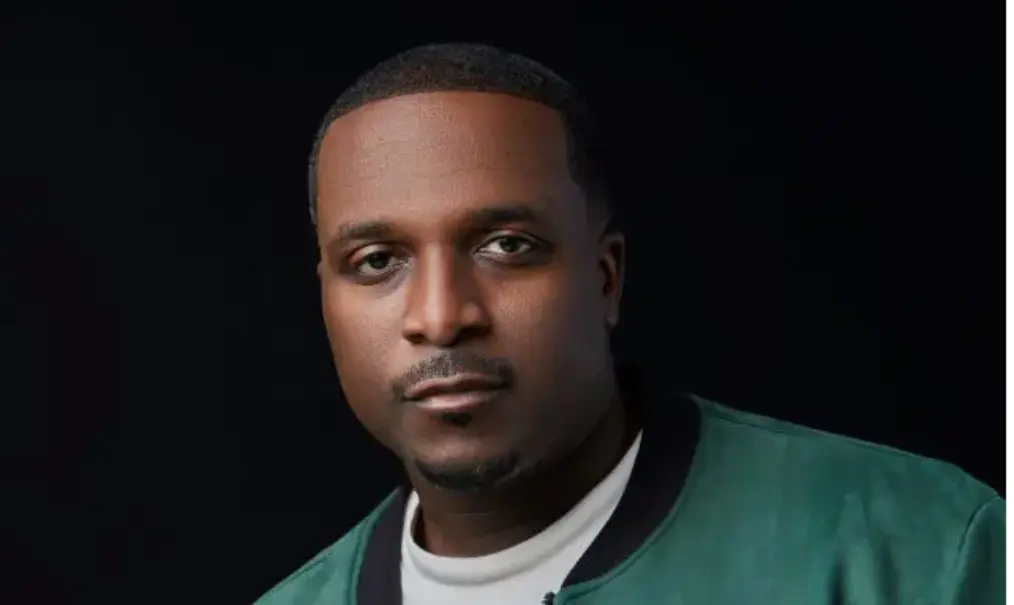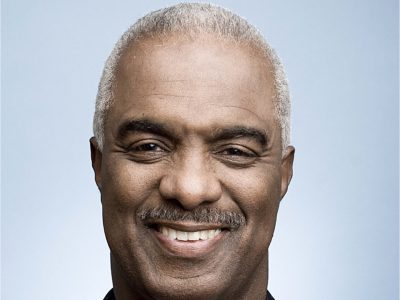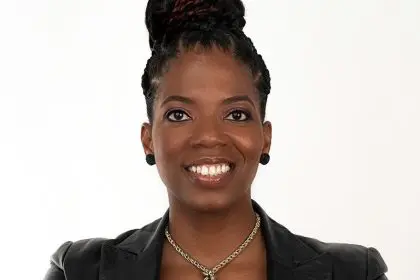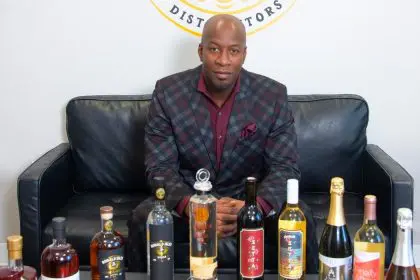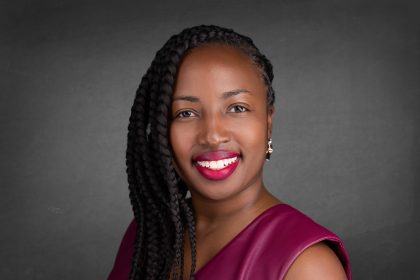Andre Hill is a second-generation McDonald’s owner-operator based in Columbus, Ohio. He became one of McDonald’s newest owner-operators in December 2019, committed to moving the culture and providing opportunities in the communities he serves. Andre has created his own lane in the business through forward-thinking ideas, strategic planning, and continuous innovative tactics.
He took a break from his busy schedule to engage in a conversation with rolling out publisher and CEO Munson Steed. Here is their insightful conversation.
Munson Steed: Ladies and gentlemen, this Munson Steed and welcome to another edition of CEO to CEO. I’m so proud of this young man. He truly has studied the game. He understands what it is. He has a gold mind, he has a masterful mind, and he clearly is a student of what it is to make progress to invest in the community. He is a second-generation entrepreneur, my dear brother, Andre Hill, how are you?
Andre Hill: Hey Appreciate it, man. We need to get some sound effects behind all that, you know, running. So we hear claps and everything. [woooo] Hell of an introduction man, I appreciate it.
MS: When you think about the second generation. What it is to run an international brand of food and engagement of community at McDonald’s, and understand that even where there is food inequity and individuals like you, if there weren’t McDonald’s in some hoods. In some locations, there may be no breakfast or no examples of black-owned businesses. Can you speak to that?
AH: Yeah, I think it’s, that’s a really good question, man. It’s actually twofold, you know, a lot of people get on McDonald’s. They think our foods are or what should I say, less than quality of what have you, you know, in comparison to many references, even the black community you get on McDonald’s. But one thing’s for sure, McDonald’s typically, the owner operators in the hood look like the folks in the hood. Typically, the owner operators in the hood are hiring from the hood, which is creating economy. And to your point, man, you know a lot of hoods are food deserts, you know.
You want to go and get potato chips and yo-yos, and ho-hos whatever, you know, down the street, and some and some pink lemonade then have that. But you know, if you really wanna a fresh cooked meal, right? The American classics: burgers, fries, shakes, what have you, you know, on a dessert, particularly your fancy. that you know where McDonald’s is. Typically, you can come, you can walk to ride a bike or take a bus in our neighborhoods. And you know, another thing, you know, you brought up representation, you brought up exposure, you know.
I’ve had kids that look at me, and even my mom, for instance. You know, they look at us, says as auntie, uncle, you know the dad they never had. Somebody that they never saw before, that now they have. They understand places in life they can get to because of conversation that we have, right? They see a black man owning the business of which the one of the largest corporations in the world has founded. And so you know, point in case, both sides to that coin man. There’s no benefit like this being a black owner operator, being able to impact the communities that we serve.
MS: You know, when you think of a Jim Thrower and who has truly created Nextgen, multiple cities. What’s it like as a younger black man to be able to see a role model, who if you choose to? Can have 30 stores or across the country. What’s that feel like as a CEO?
AH: Yeah. It feels incredible, honestly. And you talk, you bring up Mr. Thrower. He’s somebody that’s impacted me gratefully, you know, before I even came to help my mom run this family-owned business. I worked for him for a whole year while I worked in corporate America. Because time after time, kid after kid, Jim and Mrs. Thrower, you know. They have created an enterprise that did not just include them, and they didn’t force their kids to get into the business. But their kids understood, because the matriculation that they had going through, you know, being kids wiping off tables have responsibilities at the restaurant. They understood what generational wealth really meant to the black community.
And so a city like Detroit, right? You know the Throwers? Everybody knows the Throwers. If they know them personally or not. They have had some sort of impact with them, whether it’s their cousins, their brothers, their sisters, teachers, schools that they go to, right? The impact is felt. And so, seeing what the Throwers have done for not just that first generation, but the second generation, gave me the manuscript, gave me the layout, the blueprint of what I can do. You know, further and beyond even what they have created for their family.
MS: You know, for most people that may not know it but you know, you decided to get an MBA. Why and how do you apply your MBA to being a CEO now of the Hill organization?
AH: I got an MBA. So when I was a kid, I always knew I was going to go to college but because I’m around people, you know, that that have mentored me, people that run in circles such as you Munson and you know, I’ve been able to see just what black excellence looks like, and how people have been able to garner black wealth that come from nothing, right? I felt like it was remiss for me to not use my opportunities and use the doors that I’ve been able to to have open for me for my support system and kick more doors down to enhance my skill set, enhance my knowledge base, so that I can still continue to carry this torch and pull more people up like folks like you have done for me.
And so, not only did I want to do that for us but myself. You know, no matter what facet in life I’m in, right? I can buy all the jewels, I can buy all the cars, I can buy all the shoes and that can be taken from me. But you know what cannot be taken from me, my knowledge, my skill sets, you know, what’s up here. And so, whether it’s been corporate America or running my family-owned business. I have been able to add instant impact in whatever facet of business I’ve been in ever since I received my MBA.
One of the best, one of the best choices ever made in my life was to go and get an MBA. And it was during actually, you know, what really made me do it when I did? The market was flat back then when I got it. Was like that … like 2007, 2008. Nobody was hiring, and I’m like, you know, I could go try to get a job. Get a lower paying job, you know, which I’m probably doing a lot more for inadequate pay or why don’t I just take this time while the economy is down and go pursue my MBA. So, when I get out, you know, I can kick some butt.
MS: You know, family-owned businesses. How important is it for us to create in a general way, in a generational wealth through family-owned businesses?
AH: Well, that’s the only way we’re gonna be able to get ahead. You know, we are consumers. White people know it. Asians know it. You know, we are not, we were not trained in a sense, I would say, from us coming over to America the way that we were brought here. We were not trained, in a sense, to be owners, to be leaders, to be those of economical power. You know our spending power is far greater than anybody else’s, but watch us, our buying power is because all we do is spend our money, you know. So, in order for us to retrain our focus, we have to be able to understand that we will not ever get our families ahead if we do not have ownership in something. Therefore, once we can get our families ahead, then we can start to work on our ecosystem as a people.
You see it time and time again, you know. Jewish communities, right? They’re not dependent upon other folks. They could probably shop with themselves and you know, just interchange their money 10 times over, right? They don’t care if I’m gonna come purchase from them. Because they know that they’ve created an ecosystem in which the economy is always going to generate some sort of income for everybody that chooses to participate in that economy. Arabs, you know. I come from a city where we have a lot of Eastern Europeans. We have a lot of Middle Easterners. And even when I’m at in Columbus, I see a lot of Eastern Africans, you know these, and they’re black. But they don’t have, they have different mind sets than us because they come from somewhere else. Right?
They come from a foreign territory where things are not given, things are not expected, and they know what it takes in order to build wealth, and how important is for them to build it for their communities. And so we need to take on some of these aspects and start functioning in some of these ways, so that we can really enhance Black America. If we don’t start doing it now man, we about to be broke.
MS: About to be broke. There’s a whole movement during black history. You have been a true celebration, not that you don’t. Obviously, we both celebrate, rolling out 365, McDonald’s 365. So that’s not new.
AH: Black and positivity golden?
MS: Black and positively golden but 100%. You also empower, and I think that people don’t understand the suppliers. So, you’ve picked to collaborate with a young brother? Why did you choose to collaborate in our community and create expressions that will enhance our community’s relationship? And can you kind of share with us? What that collaboration looks like and feels like, and why you chose the young entrepreneur to collaborate with?
AH: Yeah. So, this is the second time around that I have collaborated with a black owned clothing brand to bring about merchandise for Black History Month. Between my family-owned McDonald’s and a dirt label. We have collaborated, like I said, to bring merch for Black History month. We started this in 2019, I believe, before COVID hit and this is the first time again that we’re doing it after that.
But it’s important that we support each other. I mean, like, yeah, I could have probably had any company collaborate with me to make a design but the passion, the understanding, the speak, the culture, right? None of that stuff would be conveyed if it wasn’t a black company that I collaborated with in order to bring about an incredible Black History Month campaign.
MS: You know. You say that, but you’re bringing it to places where young people may not have access to understanding the positive gift of being around an entrepreneur like you. Why are you so committed, Andre? To making sure that young people in places like a Columbus, it’s different in a Detroit where, you know, literally, there’s not only a Jim Thrower, there’s a Joni Thrower, there’s a ton of Bill Picard.
Whole group of lighthouses lit up the sky in a Detroit. So, it’s not a big thing for Austin to say. I walked in Munson’s office, and I was with him. He sees that, that success. Why is it important to bring the light as an entrepreneur, and CEO to places like Columbus, and even some of those outside of Columbus that really would have never seen you or the merch to walk through?
AH: So, to your point, the examples aren’t there. I was lucky enough to be born in a place. I was born in Flint, Michigan, raised in Detroit, raised around black people that were really getting to the dollar, whether it was corporate America or their own businesses. But you know, outside of places like Detroit, Atlanta, your Chicagos, your Houstons, you know, to see a black person in ownership of anything is rare.
When I moved to, when I moved to Ohio, I did not know, I didn’t understand. You know, the significant differences of where I came from versus what most of America actually looks like, you know. And so, it’s important that again, the communities that we serve, the people that I’m able to expose to such things as black ownership. They understand that we are able to create, we are able to embrace, we’re able to celebrate who we are and they, you know, we should be celebrated.
MS: Lastly, there was a young man who needed a suit. Maybe I don’t know why. What made you buy a young man who was heading to college a suit?
AH: Man! It’s just necessary. I’m not the type of person that, I look at things from a full-circle perspective. I could’ve given him some money, right? What would he do with it? In forward thinking, a suit is going to go much further than a couple $100, even if I gave him a thousand. Because that 1,000 will be used up right then and there. When he has to go on his interviews for internships, he’s going to use that suit. When he has to go on interviews for a real job, when he’s upon graduation, he’s going to use that suit. If he has to interface with professionals, career centers, right? Committees, what have you? He’s going to need that suit.
And I know that’s something that a lot of young black men first off, if they don’t have their fathers in their lives, or black men that have even worn a suit or tied a tie, right? These are things that they just won’t ever think about, you know. Even with me, talking to young black dudes about cutting off the — what they call that? — the tag that’s usually on the arm. You know what I mean, brothers I see at a business event, you notice, still got the tag on it. They sharp though, but they don’t realize well … that you know just simple things like that man.
It could make or break that first impression, it could make or break you know, just there. What should I say? Their inner strength because people might be looking at them, dogging them. you know, turn them down just because some simple they don’t know to take this tag off, right?
MS: Lastly, if you were given a speech at AU or Michigan State to the graduates about being a CEO, what would you challenge them to do as CEOs of the future?
AH: Of the future? Man, I would just challenge them to never get tunnel vision. Never get tunnel vision. If you don’t, if you can’t see things outside of the purview that you think are important. Then you’re gonna stop your growth and you will get passed up by those who can.
MS: Cool! Thank you, this has been great. We’ve got one of my favorite young CEOs, who are truly mastering the game of being there. Second-generation McDonald’s owner, big ups to the Hill family, the whole family, and much love, obviously to the McDonald’s Corporation for continuing to encourage black ownership of franchisees, and for those who have shined a light like a Jim Thrower, where we know there wasn’t one before he took the torch. He and his wife, I should say Mrs. Thrower, a big part of it and shout out to your mom, Andre, for all that she continues to do in the community as well. I’m Munson Steed and this has been CEO to CEO with Andre Hill.
AH: Thank you, man. Let’s get [those] sound effects going.

